12 Easy Ways to Become A More Eco-Friendly Vegan
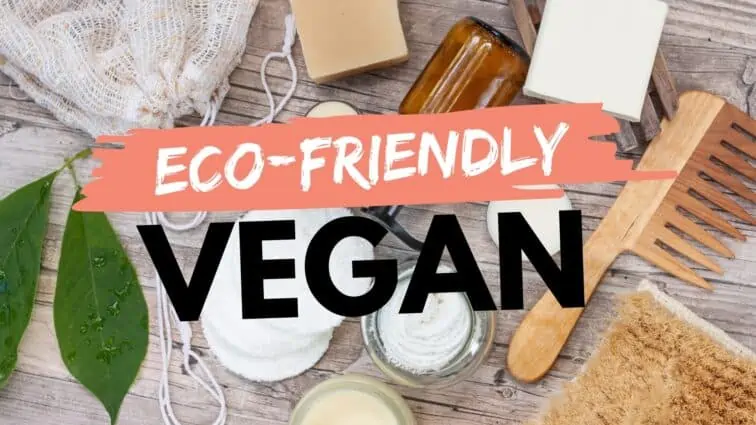
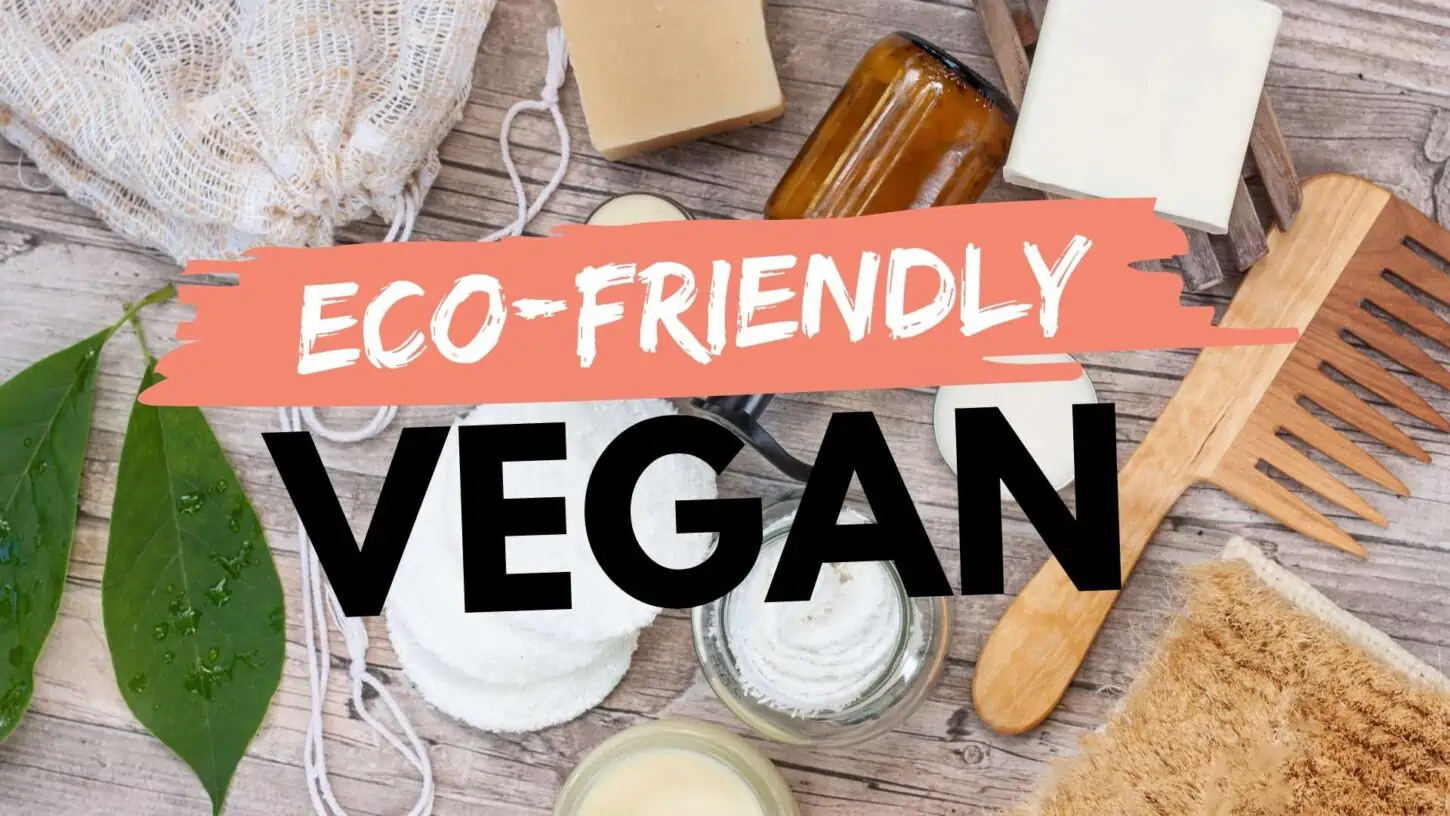
You want to know what’s even more elusive than Sasquatch or the Loch Ness Monster?
It’s a Perfect Vegan.
But don’t give up, our plant-based pals, because although no one of us will ever be a “perfect” vegan, we can always become better vegans.
Although there are 1,001 different things that you can do to become more compassionate and improve your impact on the world, today’s post will specifically focus on what you can to do to live a more environmentally-friendly lifestyle.
Table of Contents
- 1. Minimize Food Waste
- 2. Shop From Bulk Bins
- 3. Use Reusable Shopping Bags for More Than Just Groceries
- 4. Use Glass & Silicone Storage Containers
- 5. Purchase From Eco-Conscious Brands
- 6. Switch to Bar Soap & Solid Shampoo
- 7. Ladies, Give Your Period An Eco-Upgrade!
- 8. Rescue Lone Bananas At The Grocery Store
- 9. Don’t Buy (Or Take!) What You Don’t Need
- 10. Shop Second Hand
- 11. Check Out Your Local Library!
- 12. Start A Compost!
- Why Sustainable Choices Matter
- Zero-Waste Vegan (Podcast)
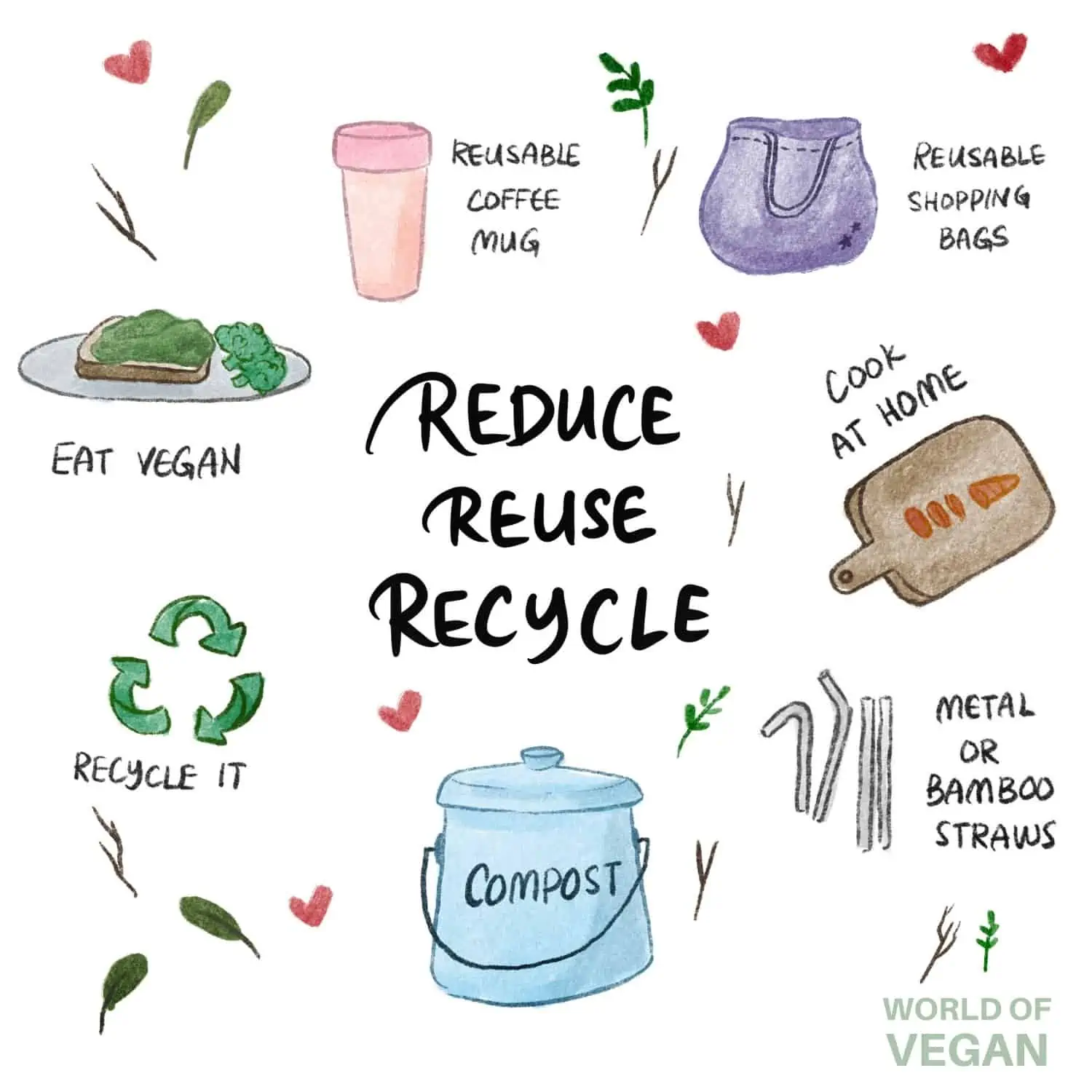
1. Minimize Food Waste
Food waste is one of the worst things that we as a society can do for the environment.
Wasting food wastes the time and effort that was spent growing the food, shipping it to the supermarket, and the hours you spend earning money to buy that food. Even worse, it can also waste water that was used to grow the produce and increase a region’s carbon footprint once it’s been discarded.
While it’s incredibly difficult to eliminate food waste altogether (after all, some things can spoil sooner than expected), there are ways to eliminate how much food you waste as one person.
Simple Ways To Limit Organic Waste:
- If you have a lawn or garden, consider composting certain food scraps.
- If you’re a big fan of citrus, consider making jams out of the citrus zest, or toss the peels down your garbage disposal for a cheap DIY way to make your sink a little less smelly.
- Have some carrots and celery that are close to spoiling? Salvage what you can and use what remains to make your own vegetable broth.
- Do you find yourself habitually buying too much of certain ingredients, or have unusable quantities of spices and certain products in your home? Take measuring cups with you to the supermarket and buy from bulk bins whenever possible so that you can buy the appropriate amount of each item.
2. Shop From Bulk Bins
There are limitless hacks for reducing how much food we waste, but not all will be feasible or applicable to your unique situation. Feel free to experiment with different hacks, and remember that following an eco-friendly lifestyle isn’t about being perfect, but rather about doing your best.
We’re not talking about buying that 50-pack of toilet paper from Costco (that can actually create more waste). We’re talking about those bulk bins you see in many natural food stores and an increasing number of mainstream supermarkets like Whole Foods Market, Sprouts, and WinCo.
Buying in bulk is a great way to save some moolah (seriously, the price difference between bulk and packaged items can be staggering). But it can also dramatically reduce the amount of single-use plastics you personally contribute to the landfill.
What You’ll Need to Shop In Bulk:
- Reusable Bulk Bin Shopping Bags (bring to the grocery store and fill with dry bulk bin items)
- Wide-Mouth Mason Jars (to store bulk brains, beans, cereals, and other pantry items)
- Nut Milk Bag (so you can buy raw nuts and make your own nut milk)
Great Items to Buy From Bulk Bins:
- Oats
- Beans / Lentils
- Grains
- Nuts & Seeds
- Cereal
- Dried Fruit
- Coffee Beans
- Spices
- Flour
- Sugar
So many food items, even vegan-friendly ones, come in a lot of unnecessary packaging that ends up hurting our planet at the end of the day. By purchasing pantry staples from bulk bins and bringing your own reusable bags, you reduce how much plastic and other materials your purchases require, thus minimizing how much of those materials end up plaguing the environment.
Think of all the plastic packaging you tear open and immediately toss in the bin. Bags of rice, nuts, dried fruit, cereal and beyond. Cans of beans. Containers of soy milk. At the end of the week, how much trash are you lugging out of your home? I imagine almost all of us can do way better on this front. I know I can.
Swapping packaged items for the exact same pantry staples purchased from bulk bins can pay off in a big way over time. If we all do more of this, our efforts will make a massive difference for the sustainability of our planet.
3. Use Reusable Shopping Bags for More Than Just Groceries
So we know what you’re thinking: Well of course I know to use reusable shopping bags, Michelle! But friends, we thought it was worth repeating, considering how single-use plastic is impacting the environment and wildlife.
Millions of animals are impacted by single-use plastic items like plastic shopping bags each year by ingesting plastic, getting tangled in plastic bags or netting, or getting injured by sharp or otherwise injurious plastic items, to name just a few negative effects.
So in 2019, friends, it’s time for you to ditch plastic shopping bags once and for all, regardless of what you’re going shopping for.
We recommend keeping some reusable grocery shopping bags in your car and collapsible bags in your purse/backpack/messenger bag at all times so that you’ll have an eco-friendly bag on-hand even when you make unexpected purchases.
4. Use Glass & Silicone Storage Containers
Okay, so plastic storage containers are a great idea in theory, but they get weird food stains, can warp in the microwave and dishwasher, and aren’t always the most environmentally-friendly option out there considering how many alternatives we have available and that less than 10% of plastics actually get recycled.
So friends, please do this revolving rock that we call home a favor and consider using glass, stainless steel, and silicone storage containers instead of disposable plastic. The recycling situation for these two materials is typically more straightforward than for the various kinds of plastics that we consumers use and they tend to look as good on the 100th time you’ve used them as the first time.
And from a stylistic perspective, can we just say that using glass storage containers make your kitchen storage look super sleek and organized? And silicone “plastic” baggies like the Stasher bag are great for looking cute and sustainable whether you’re packing your lunch for work or snacks for your kids.
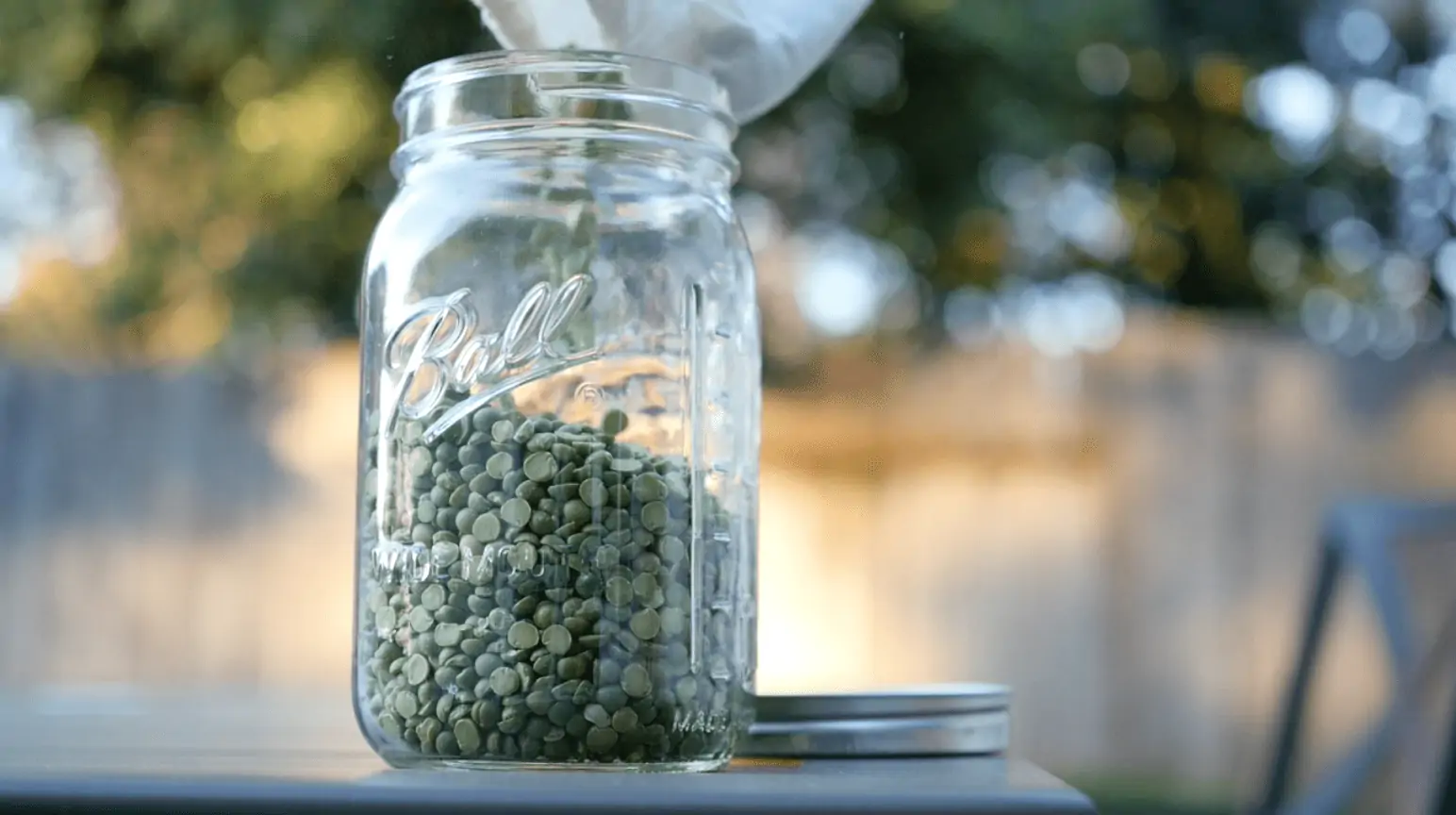
5. Purchase From Eco-Conscious Brands
We know what you’re thinking—how can buying more stuff be environmentally-friendly?!
Hear us out.
It’s not about purchasing more stuff. It’s about investing in items that are made well (and consciously) that will stand the test of time. Ultimately, that will lead to purchasing significantly less stuff.
Purchasing from brands that are environmentally-conscious can set off a domino effect. When you purchase from these brands, you’re sending a signal to that company—and their competitors. A message that consumers not only are willing to pay for products that don’t damage our environment, but that they are actively seeking them out. That’s the power of voting with your dollars!
This, in turn, will encourage companies in the space to create more products that are eco-friendly and find ways to make their products even more eco-conscious.
Look for brands that use recyclable packaging—or better yet, no packaging at all (like bulk bin items or shampoo bars from LUSH)! Look for brands that use natural ingredients instead of synthetic chemicals that can plague our oceans. Show some extra love to brands that are actively working to create a better world.
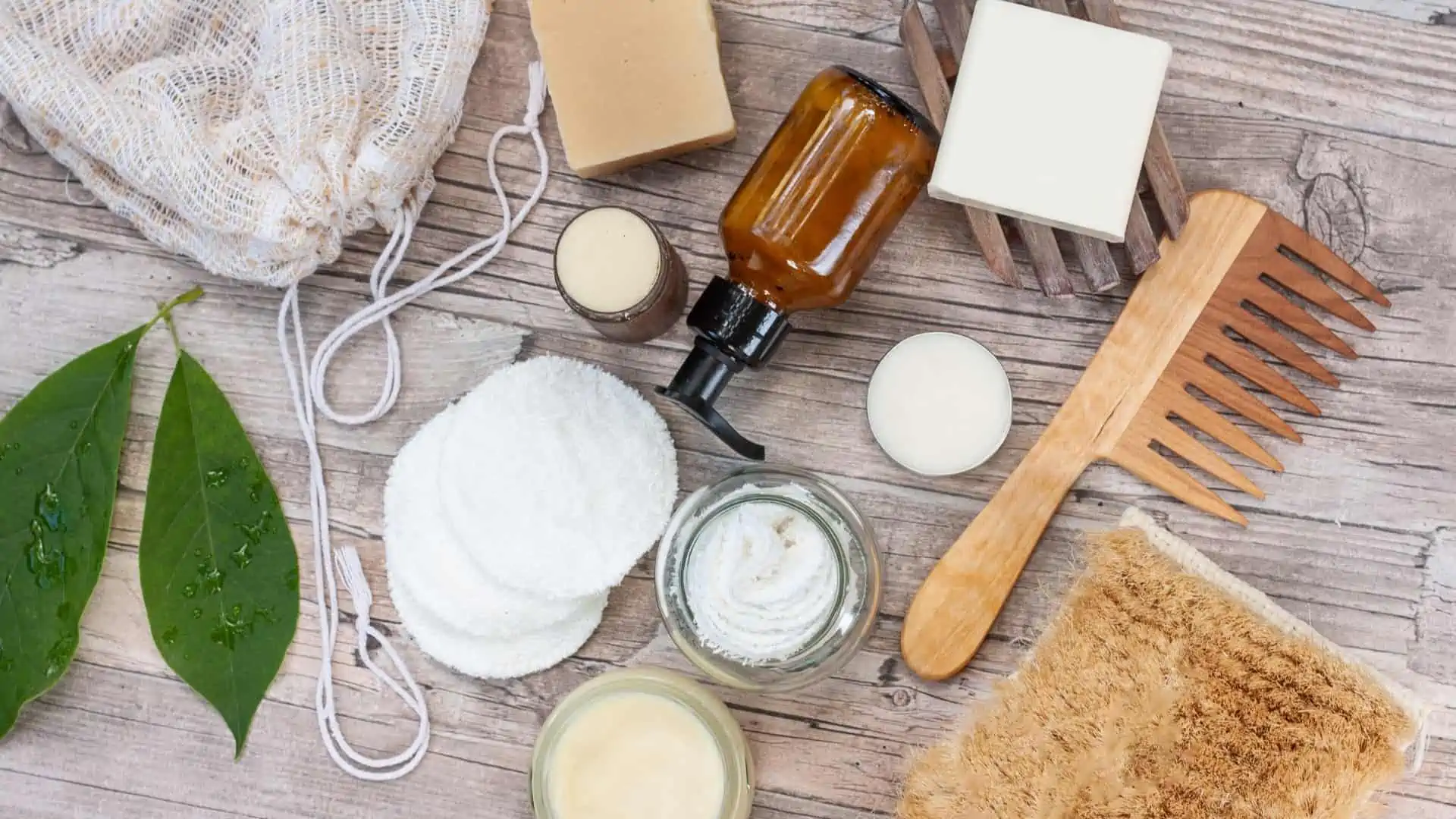
6. Switch to Bar Soap & Solid Shampoo
Ready for one of the easiest things you can do to prevent plastic waste? Switch to bar soap and shampoo bars!
The thick plastic bottles that house liquid soap, shampoo, bubble bath, and other bath and body products may seem like a necessity. But it’s only a necessity if you’re using liquid soap (and even then, you can get reusable glass bottles and shop in bulk)!
Why Buy Bar Soap
When you take the liquid out of the equation (which you really don’t need—you’re using them in the shower with plenty of water, for goodness sakes!) you can remove 90% – 100% of the plastic packaging. Just make sure it’s vegan, as some soap contains animal fats or even milk products!
Once you switch to bar soap, you won’t want to go back. It will become instantly clear how unnecessary all those plastic bottles were. Bar soap works just as well.
It can even be used as shaving cream, ladies! Seriously, I used to buy those foam shaving creams with all kinds of packaging, but my friend turned me on to using bar soap instead. As long as you’re using a good sharp razor (which you should always be doing anyway), it works just as well—with fewer chemicals, shower real estate, and waste.
How Solid Shampoo Is Awesome
Now let’s talk about shampoo. There’s a good chance you’ve never even heard of solid shampoo before now. I certainly hadn’t, until I discovered these peculiar round shampoo bars at a LUSH store.
I picked one up for travel purposes—I was going to be traveling abroad to Israel and wanted to bring a compact shampoo without weighing down my luggage or getting flagged by security. It worked great for the trip (you can get these reusable tins to store them in). In fact, it worked just as well as bottled shampoo with zero waste!
So I ditched bottled shampoo and replaced it with solid shampoo in my shower. I now use it all the time as my go-to shampoo. I highly recommend giving solid shampoo bars a try!
Note: I haven’t found a good solid conditioner yet. I’ve tried a few but didn’t like them. If you have any you love, I’d love to hear about them!
7. Ladies, Give Your Period An Eco-Upgrade!
Boys, feel free to turn away if the mere thought of a period as anything other than the end of a sentence gives you the heebie-jeebies. It’s all good, I won’t pass judgment.
Ladies…hey! You’ve probably heard of menstrual cups by now (such as the Diva Cup or Lena Cup). They’re all the rage in the zero-waste, eco-conscious space, and for good reason.
The average woman will use around 10,000 tampons in her lifetime. Picture that in a pile. Is that really the kind of legacy you want to leave behind on Planet Earth?
If not, menstrual cups are a great alternative that will not only spare the planet from lots of nasty garbage but will also save you thousands of dollars over your lifetime.
These forever-reusable cups have mixed reviews—some love them, others hate them. But one thing is not up for debate. Switching from disposable tampons to a silicone menstrual cup will prevent massive amounts of waste over time (and will also save you loads of money).
If the thought of sticking a silicone cup up there is a little too “modern” for you, a step in the right direction is to choose organic tampons without plastic applicators. This plastic in applicator tampons drive me crazy. It’s used for one brief moment and immediately discarded. And trust me, ladies there is absolutely no less desirable type of plastic to remain on our planet for centuries than our used tampon applicators.
Yuck, yuck, yuck.
If you insist on using tampons (which I often do), go with more eco-conscious brands like The Organic Project, or options that have paper wrappers and cardboard applicators (or even applicator-free tampons) to spare our planet.
8. Rescue Lone Bananas At The Grocery Store
Have you ever stopped by the banana aisle at the grocery store, grabbed a bundle of bananas, peeled off the exact number you need, and tossed the remained back in the pile? Me too.
That was before I heard the lonely banana song by Kathryn Kellogg at Going Zero Waste.
I’ve since learned that single bananas whose connected friends have been torn away from them are 60% more likely to be thrown out by supermarkets and never find a home.
Now, whenever I’m at the grocery store buying bananas (and I go through a lot of bananas), I delightfully pick up all the lonely single bananas I can find and drop them in my cart.
Even my husband has joined in the fun. The other day he ran over to me saying “I saved a banana today!”
9. Don’t Buy (Or Take!) What You Don’t Need
This should probably be number one. I attend a lot of large expos (like the Natural Products Expo West) and watch as attendees shuffle through stuffing ginormous bags to the brink with samples and plastic chatchkas they will never use. Most of these freebies will land right in the bin. The lure of “free stuff” is really, really hard to resist for us human beings. We’ve evolved to have a propensity to hoard and collect things from all the times of scarcity our ancestors survived through.
But today, many of us suffer from the opposite of scarcity—we suffer from stuff-overload. Do you really need that plastic brand-stamped bag clip? That magnet with a bunch of business phone numbers on it? We feel compelled to grab anything that has any value… but try to reframe your thinking. Does it have value (and bring joy) to you? If not, walk on by.
Get yourself a copy of The Life-Changing Magic of Tidying Up, the bestselling book by Marie Kondo that has inspired a much-needed wave of minimalism. Hold onto that peaceful concept of minimalism and just say “No thank you.”
10. Shop Second Hand
We all donate our unwanted clothes and household items to thrift stores. But have you ever shopped at them?
Many of us grew up with this idea that second-hand shops are only for individuals who can’t afford to buy new things. Not so!
Luckily, this perspective is shifting rapidly as humanity becomes more aware of how unsustainable it is to buy everything brand-new. One man’s trash is another man’s treasure, right?
Beyond the usual Goodwill and Salvation Army thrift stores, there are lots of trendy second-hand shops popping up (like Crossroads Trading), and you never know what gems you may come across when you start to explore them! It’s common to find extraordinarily expensive name-brand clothing and products that are barely used for next-to-nothing.
Today you can even shop for clothes at online second-hand boutiques like Thred Up. They wash, fold, and send you everything in the mail so it really does feel like new.
And of course, there’s always e-Bay, Craigs List, and Facebook Marketplace to turn to when you’re looking for something specific.
11. Check Out Your Local Library!
How often do you go back and re-read a book on your shelf? Probably close to never. So, instead of buying brand-new books on Amazon (that will likely be shipped with way too much packaging), save some money while you’re saving the planet by checking books out at your local library instead!
Double your impact by taking that money you save from borrowing books instead of buying them and put it toward some of these pricey-but-awesome reusable food bags.
Want to be really extra? Set up your own Little Free Library in your neighborhood. Your neighbors will love you for it.
12. Start A Compost!
This is a more advanced step that won’t be applicable to all of you, as you’ll need composting supplies and outdoor space to keep it in.
But even if you can’t start your own compost pile, you can compost your food scraps! If your city has a residential compost program, that will be easy. Just learn what can be composted and what can’t, and get into a good practice of throwing your waste in the correct bin.
Sadly, not all cities have such programs. If you don’t there are still ways you can compost your scraps. You can find a neighbor who has a compost that you can donate your scraps to…or you can even bring your scraps to a local business that has a compost bin (such as a Whole Foods Market or other natural foods store). You may look silly bringing a bag of compost with you to the store…but anyone giving you a strange look may get inspired to do the same once you share this creative eco-friendly tip!
Or, you can invest in a Lomi electric composting machine! It’s perfect if you don’t have a garden, live in a city without curb-side composting pick up, or just have a small home. It’s a wonderful, earth-friendly alternative!
Why Sustainable Choices Matter
Planet Earth is the only place we have to live. Yeah, yeah, maybe the wealthiest among us can migrate to Mars one day if Elon Musk comes through. But as of now, there is no Planet B.
Our society is currently set up in a way that we don’t have to think about the consequences of most of our actions. Sure, if we physically assault another human we could be punished. But unelss we’re a business, we can assault our planet all day every day and never personally pay the price.
But a price is always paid, even if not by you or by me. The price may be paid by the fish in the polluted rivers and streams, by lower-income communities, by wildlife, by our children, or by our children’s children.
View this post on Instagram
As the health of our planet declines, all those who call Earth home forever into the future will pay the price of our actions right now.
We can throw out our trash without a second thought, but that doesn’t make it an innocent act. It has consequences, as do all our actions. It’s time we start taking responsibility for them.
Zero-Waste Vegan (Podcast)
In Episode 12 of the Plant-Powered People Podcast we talk all about zero-waste living with Colleen Patrick Goudreau. Enjoy!
Photos by Michelle Cehn and Canva.com. Please note that this article contains affiliate links which means shopping through them helps lights on here at World of Vegan!

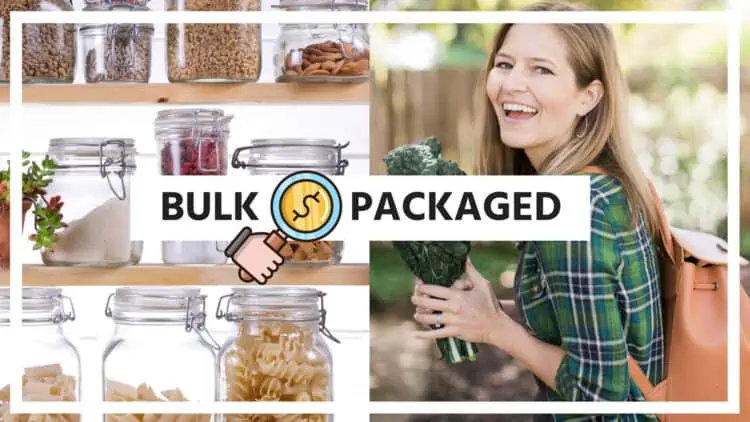
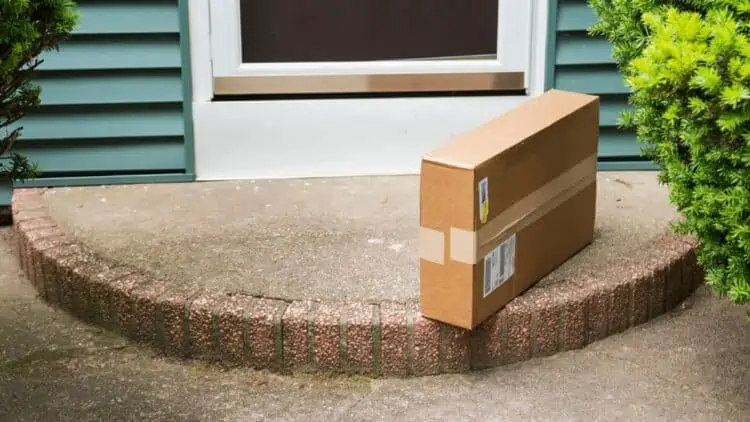
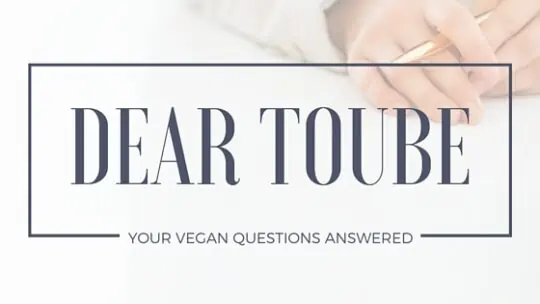
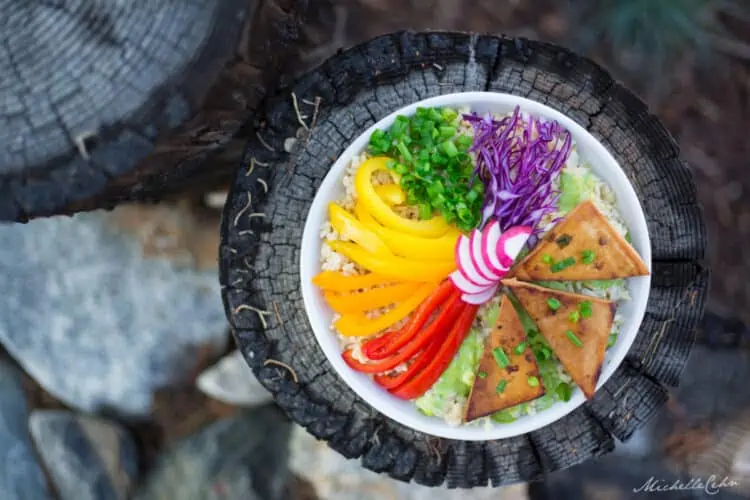
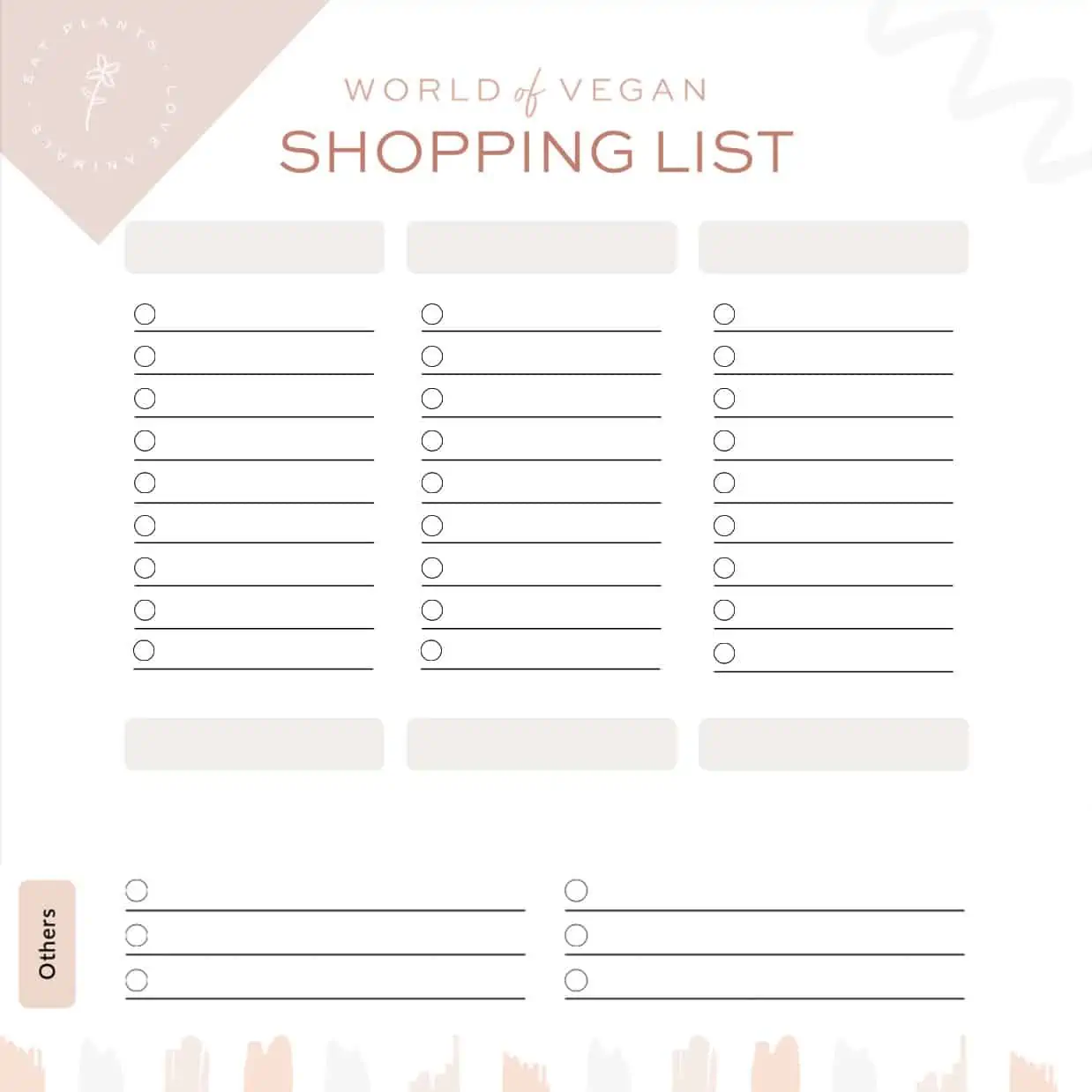
Leave a Comment